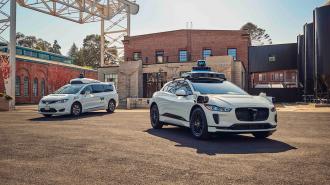Uber is teaming up with Waymo to offer rides in fully autonomous cars in Phoenix — launching a partnership that could be hugely beneficial to both companies.
The background: Waymo started as Google’s self-driving car division back in 2009, and today, the Alphabet subsidiary is a leader in the robotaxi industry, with a 180-square-mile service area in Phoenix — the largest in the world.
In 2015, Uber — the world’s biggest ridesharing company — started to worry that autonomous cars were a threat to its business model, so it launched a division focused on developing them in-house.
Two years later, Waymo actually sued Uber for allegedly stealing trade secrets. After a multi-million dollar settlement (and a pedestrian death), Uber ceased its self-driving operations, and by 2020, it had sold off the division.
“We’re excited to bring Waymo’s incredible technology to the Uber platform.”
Dara Khosrowshahi
Team work: Since then, Uber has used partnerships with other autonomous vehicle (AV) companies to essentially outsource its self-driving operations. In Las Vegas, for example, people can use the Uber app to hail a robotaxi (with a human safety driver behind the wheel) operated by AV startup Motional.
Now, Uber is teaming up with Waymo, announcing on May 23 that a “set number” of its former adversary’s autonomous cars will be hailable through Uber’s app later this year.
“Fully autonomous driving is quickly becoming part of everyday life, and we’re excited to bring Waymo’s incredible technology to the Uber platform,” said CEO Dara Khosrowshahi.
Win-win: While the partnership will help Uber meet customers’ evolving expectations, Waymo will get instant access to Uber’s huge customer base. That should help it meet its goal of increasing the number of rides it provides 10-fold by the summer of 2024.
“Uber has long been a leader in human-operated ridesharing, and the pairing of our pioneering technology and all-electric fleet with their customer network provides Waymo with an opportunity to reach even more people,” said Tekedra Mawakana, co-CEO of Waymo.
Looking ahead: As of 2022, Waymo only had 300-400 autonomous cars in Phoenix, so depending on the exact number made available via Uber and how popular they are, demand might outstrip supply, at least initially.
Waymo could always increase the fraction of its fleet available via Uber, though, and if the partnership proves really popular, it’s not hard to imagine Uber expanding it to include other places Waymo operates.
Currently, that means just San Francisco and Los Angeles, but as Waymo grows, Uber’s self-driving service area could grow right along with it.
We’d love to hear from you! If you have a comment about this article or if you have a tip for a future Freethink story, please email us at tips@freethink.com.
